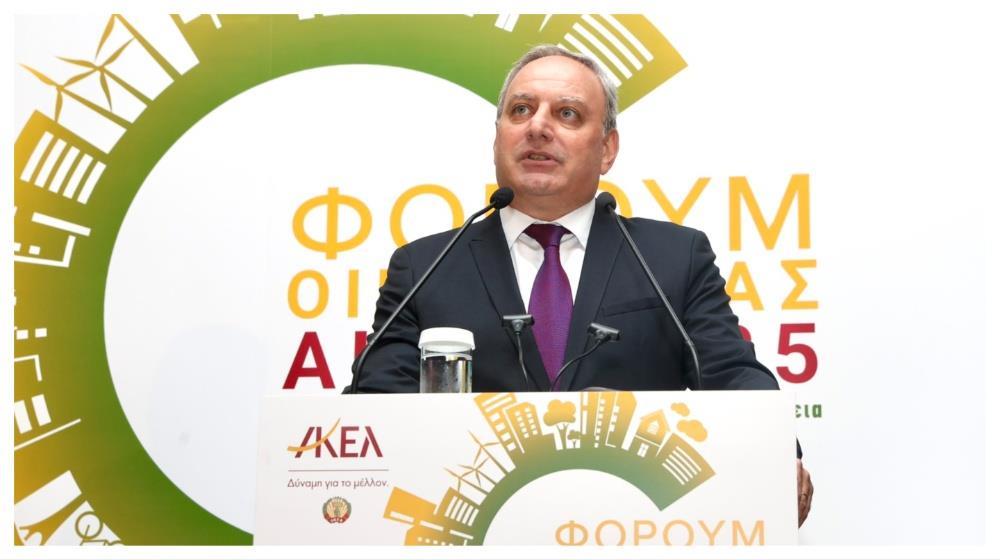“Cyprus must clearly define the type of development it desires for its future,” AKEL General Secretary Stefanos Stefanou warned in his opening speech at the party’s Economic Forum.
In the same context and sending clear messages to the government and citizens, Stefanou stressed that economic growth only makes sense when it serves social well-being, resilience and environmental protection. Cyprus, he added, is at a critical juncture, with the development model having exhausted its limits and the major challenges requiring profound changes and careful strategy.
The General Secretary of AKEL stated that the era is characterised by multiple crises and complex problems that affect the economy and the daily lives of citizens. For this reason, politics, according to him, requires solid foundations of knowledge and clear direction. Knowledge without a social orientation produces barren results, just as politics without a scientific basis gives way to conveniences and frivolous approaches. He also said that the meeting of documentation and social responsibility is the only path to effective solutions.
The focus of his speech was the need for a change of philosophy. Although macroeconomic indicators show a positive picture, the architecture of the economy remains vulnerable and reproduces imbalances, is the position of the party's General Secretary.
Stefanos Stefanou stressed that growth is still based on sectors sensitive to external shocks. He stated that accuracy burdens households and businesses, while debt reduction is not accompanied by an equally strong disengagement of the state from practices that burden social resources. The existence of a surplus does not translate into a strengthened welfare state or a stronger development policy, since the picture remains more managerial and less strategic, his observation is.
At the same time, the General Secretary described a set of structural weaknesses that limit the country's prospects. "The digital transition is progressing slowly. Major infrastructure projects are encountering systematic delays. The effectiveness of justice, addressing entanglement phenomena and strengthening institutions remain outstanding issues that require determination. The demographic problem, the aging of the population and the lack of specialised human resources are intensifying the pressures," he said. In this environment, "the economy is growing but not changing its character, resulting in the accumulation of gaps and inequalities," he said.
He made particular reference to the fact that, according to AKEL, growth does not reach the real economy satisfactorily. Furthermore, he noted that bank liquidity is not being converted into sufficient financing, while the operation of critical markets is characterised by oligopolistic dynamics that pressure citizens and limit competition. These conditions, he said, weaken the prospect of balanced and qualitative growth.
The cost of living crisis was another key reference. The energy burden, the high cost of borrowing and the unaffordable housing compose a landscape that exerts intense pressure on the middle class and the most vulnerable groups. The weakening of social protection mechanisms exacerbates the problem, while the quality of life of many people declines. This picture, as the Secretary General explained, makes it imperative to redefine priorities.
In this context, his speech described the philosophy of a new development model proposed by AKEL.
The new development model proposed combines productive reconstruction, social justice and green sustainability, based on the following principles:
- Expanding the economy through productive investments with a permanent footprint that will serve the country's social and environmental goals.
- Strong fiscal foundations so that the state can protect society and provide them with a better quality of life
- A healthy business environment, with an emphasis on attracting productive investments, supporting small and medium-sized enterprises and creating quality jobs with decent wages.
- Fair distribution of economic burdens through a progressive tax system that will strengthen public revenues for social and development purposes. I would like to take this opportunity to mention that the tax reform brought by the government achieves exactly the opposite, instead of addressing income inequalities it widens them. Instead of making the tax system more progressive it makes it more leveling, leaving out once again the taxation of accumulated wealth and high-value real estate. If there is anything that would make it easier for low-income groups, it is the reduction of indirect taxes, but the government has nothing to show here either. It is a reform that has at its core the unfair distribution of tax burdens.
- Collaboration between the public, private and cooperative sectors, with a strong and socially responsible state that will protect the economically weaker, ensure equality and transparency, invest in education, health, housing and infrastructure, and guarantee the smooth functioning of the market against distortions and phenomena of unconstitutionality.
Stefanos Stefanou also stressed the importance of the green transition, energy security and affordable energy. The country, according to him, needs a plan that will allow for a balanced distribution of costs and the substantial integration of renewable energy sources. At the same time, he highlighted the need for a substantial housing policy that will restore access to housing as a basic social right.
In closing, he underlined that the real stakes of the times are the creation of conditions that offer perspective and security to society. AKEL, he said, will continue with responsibility, seriousness and documentation to demand policies that serve the needs of the many and ensure a sustainable, resilient and just future for the country.
(Source: InBusinessNews)









